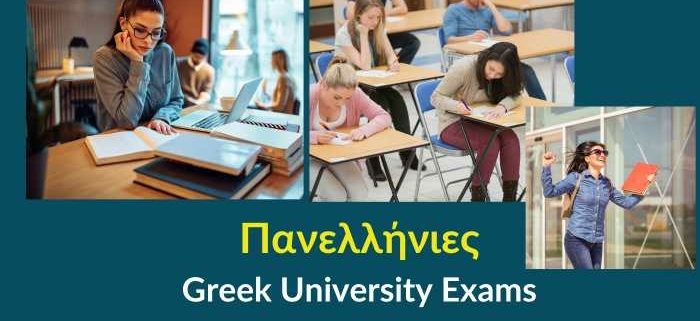Greek University Entrance Exams or Πανελλήνιες are taking place every year at the end of the school year, and it is a stressful period for many students as well as parents.
Studying at a Greek state university might officially be “for free” for students, but there are some conditions to consider; The exams leading to it are an intense and challenging process for all seventeen and eighteen-year-olds around the country. Parents usually pay a lot of money for private lessons for their children, in order to get the best results. This extra private education for preparing towards the exams usually is paid for minimum one year, but often for much longer as well. Therefore, knowing the difference between practice and theory, we believe it is not really correct to call the Public Greek Educational System “free”.
Continue reading and learn more about the Greek Public Educational system and University exams
How the Greek education system works?
The Panhellenic examinations (Πανελλήνιες)
The nationwide exams for entrance into Greece’s state universities are known as the Panhellenic exams (Πανελλήνιες) and take place in late May and throughout June.
The pressure is high – students have been preparing for this three-week-long period for many months, and usual even years. The exams themselves are very challenging, usually taking place every second or third day. Combined with modern Greek society’s view that every student should obtain a university degree, the Panhellenic exams are seen as a milestone that marks the success – or failure – of students in the Greek education system.
For most high school seniors, the Panhellenic exams are one of the most challenging, if not nerve-wracking periods of their lives, both from a physical and emotional perspective. The preparation for the exams requires intense and structured studying, which includes not only school and self-study at home, but private tutoring or attending private prep schools, the so-called frontistiria (φροντιστήρια).
Private lessons, or “frontistiria” in Greek, are popular in Greece as a means of supplementary education to help students prepare for various exams. Most families pay a lot of money for the extra education. The cost of private lessons can vary depending on factors such as the subject, duration, frequency, and the reputation of the tutoring center or individual tutor.
The schools in Greece starts on September 11th, but during the last year the students start the “frontistiria” from the beginning of July so they have extra two months to prepare for the next years exams. Moreover from February until the end of May, where the exams start, students go to “frontistiria” also during weekend.
It’s common practice for students to sometimes skip school from the Easter holidays onwards and right before the exam season kicks off to allow more time for preparation. Greek students are allowed a specific number of absences during each school year so many of them tend to ‘save’ them for the pre-exam period.
While admission into the university of the student can be hard, entering a university altogether isn’t. This sounds strange, but reason is the following;
Each exam is rated on a basis of 0-20, with 20 being the highest and 10 being considered the minimum (greek βάση). However, depending on their average score, a student might manage to get into university even if, for instance, they scored below 10 in one of their exams.
However, the difficulty to enter the University of your choice, all depends on which University, location, and which discipline you want study. The University of Athens as well as the state universities in other large cities such as Thessaloniki and Patras, are those that students (and parents) prefer most. Popular studies include – unsurprisingly – law, engineering and medicine, due to the prestige of these professions.
So for those universities and studies, you need to have very high scores, and study very hard. For other disciplines or universities in remote areas and far away from “home”, meaning you also have to pay a lot for student accommodation and tickets to travel home, it is in general much easier to get in.
How the exams are structured?
During their second-to-last year the students have to choose a field they want to study. Regarding the field they choose they take certain subjects in which they will be examined in Panhellenic exams.
The first field is called “Humanities, Law and Social Sciences”. The students are examined in Greek Language and Literature, Ancient Greek Language, Latin, and History. After the exams they can study in those universities that are referred on the title or become kindergarten, elementary school or Greek language teachers.
The second field is “Positive and Technological Sciences.” The lessons on that field are Greek Language and Literature, Math, Physics, and Chemistry and they unlock all the technological studies in University.
The third field is “Sciences of Health and Life”, and the lessons are Greek Language and Literature, Physics, Chemistry, and Biology. Taking that field leads to studies of medicine and therapy.
The fourth and final field is “Studies of Finance and Information”. The lessons are Greek Language and Literature, Math, Finance, and Programming. This field opens the way to become economist or engineer.
The exams are split into two phases:
The first includes the basic subjects of each field, whereas the second one includes ‘special’ subjects, such as foreign languages, music and design (sketching). The latter are not obligatory for all students, they are applicable for students who want to pursue a degree in translation, musical studies, architecture, and so on.
During the school year the students share all the lessons (Greek Language, Math, Physics, Biology, History) and then have some extra hours of the field lessons. The syllabus in general lessons and orientation or field lessons is different. So for example a student on the first field needs to two different syllabuses for history lesson; one for Panhellenic exams and the other for high school graduation.
Highschool graduation vs. university entrance
In order for students to graduate with a high school diploma (apolytirion, greek απολυτήριο), they need to take written exams in all the subjects that they have been taught during the last couple years of senior high school. In general, this is considered something rather easy to do, without too much stress.
However, having a high school degree, does not give you a ticket to the University.
In order to enter University, you need to do the Panhellenic exams, which are the same exams all over Greece, and not depending on your teachers in high school.
However, when it comes to admission to university, it is a total different story. Only specific subjects tested on a national scale are taken into account. Those subjects are those we mentioned previously on the fields.
As you can imagine, this system is quite cumbersome and rigid – by choosing subjects during their first grade of senior high school, students are asked to make an indirect but conscious choice about their field of study and their future careers. This is because once the students have chosen, for instance, the sciences of health studies, they cannot switch and apply to university to study history or business management instead.
(Note; these orientations apply only to the General Lyceum (Γενικό Λύκειο), as there is also Vocational Lyceum in Greece, to which different conditions and rules apply.)
Getting the “panhellinies examination results”
The results of the exams are posted on boards at each individual school, usually around the end of July. Local media often broadcast scenes of frenzied and worried students and their families who rush to the schools to check the scores listed next to their names. The exam grades are translated into points, also known as moria (μόρια). Based on the total number of moria that each student has accumulated, they can estimate if they are getting into the university of their choice. The entry requirements for each university fluctuate based on the overall performance of all students across the country each year. As a result, the points required to be admitted into each department are announced after the exams results have gone public, usually in August.
During July when the students get the results they have to make a list of the Universities they want to study. But since the basis of all the departments changes every year based on the demand of the students, it is quite unknown in which department they will get accepted. For example, a student of the fourth field that decided (for some reason) to put on their list only departments in Universities of Athens, that wanted to study computer engineering, and does not get accepted for a few moria, may end up to study accounting.
Why so many Greeks go to study abroad?
- Economic Factors: The economic situation in Greece, including high unemployment rates, limited job opportunities, and economic instability, may push some students to seek educational and career prospects in more prosperous European countries.
- Limited Study Options: The number of available study programs and fields of study in Greece may be limited compared to other European countries. Students seek broader options to match their specific interests and career goals.
- By pursuing studies abroad, Greek students gain access to a broader array of study programs and fields of study that better align with their specific interests, career goals, and aspirations. They can choose from a wider range of specialized, interdisciplinary, and internationally recognized programs that may not be as readily available in Greece.
- The Panhellenic exams in Greece can be a contributing factor for students choosing to study abroad. Stress, uncertainty and the money that need to be spent to “frontistiria” might be a key factor for many Greek students not to take the Panhellenic exams, but to choose to study in a foreign University of their choice. Moreover, even if they take the exams but they do not have enough moria for their preferred department they choose to study abroad because otherwise they need to do frontistiria for an extra year and then take the exams again. (without any guarantee you will manage to get in the University of your choice, since it all depends on the “moria” you get, and how well you write the exams…)
One more example; How to become a teacher in Greece?
If you are interested how somebody can become a public-school teacher in Greece , then click here and read the article.
You will learn what it takes, all the way from finishing high school as an 18–19-year-old young adult to studying at university, and then finding employment.
https://omilo.com/how-to-become-a-teacher-in-greece/
++++++++++++++++++++++++++++
Did you like this article and you would like to learn more things about the “real Greece”,
while immersing yourself in the Greek language and culture,
and grow your reading and listening skills?
then
the “Ultimate Listening Comprehension eBook” might be what you are looking for.
This eBook is perfect to improve your reading and listening skills, especially if you are an intermediate-advanced student.




